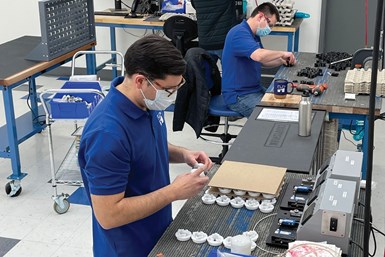CNC Machine Shop Employment Positions to Consider Beyond Machine Operators
Appears in Print as: 'Employment Positions to Consider Beyond Machine Operators'
Many machine shops have open machine operator positions to fill. But does it make sense for shops to also seek automation engineers, IT managers and assembly personnel?
#columns #workforcedevelopment
Conversations about hiring personnel for machine shops typically revolve around machine tool operators. There’s a clear dearth of talent that has shops considering various avenues to fill those positions. Some candidates might have a machining background (which could be accompanied by bad habits that don’t align with a shop’s culture or approach) while others with a good attitude, personality and the right soft skills might be worthy of investing the time and cost to train. Still, shops have to find them.
In lieu of machine operators, here are three other positions to consider. Two of these could help boost production efficiency with fewer employees. The third could offer a means to fill open machine operator positions with people who initially might not have known they’d like to operate CNC machines or didn’t think they had the chops to do so.
Featured Content

Assembly is a big part of Colorado’s Hirsh Precision. A story you can read at gbm.media/hiring-1123 explains the how’s and why’s of the contract shop dedicating personnel to perform assembly work and inventory management to produce subassemblies and completed products primarily for medical customers. Peter Doyle, president and CEO, adds that this goes beyond just providing assembly as a service. “Our engineering team is able to talk with a customer, not just about one specific part but how that parts fits in an assembly, what its purpose is, how the assembly functions and so on. This puts our team in a better position to consult with a customer’s engineers to offer manufacturability feedback while providing our team with a greater sense of ownership over all the processes that go into producing a final product,” Doyle says. The company has since consolidated that operation in Louisville, Colorado as well as its Boulder location in a single 65,000 square-foot headquarters in Frederick, Colorado. (Photo credit: PM)
Automation engineer. This job title has come up during a few recent shop visits as well as discussions at the 2023 Precision Machined Products Association (PMPA) annual meeting. There’s certainly value in having a manufacturing engineer(s) on staff. But, what about an engineer dedicated to implementing automation-centric processes? This could help speed the integration of machine-tending industrial robots or cobots, which offer a means to automate myriad other processes while functioning safely in the presence of humans. Plus, there are many different shopfloor processes that can be automated besides adding a robot. Having someone serve as a champion for these efforts can help streamline automation integration while ensuring automation projects are completed in a timely manner without hiccups that could delay full implementation that could possibly leave employees disenchanted with the prospects of automation.
IT manager. Similarly, with enterprise resource planning (ERP) software and equipment connectivity and communication becoming more prevalent, it can be valuable for shops to have someone on staff dedicated to pulling it all together.
Not only can it make the shop floor more efficient, but it can make the front office more efficient, too. Much of this can be due to the elimination of manual data entry and automatically pushing and pulling data between various disparate systems. The time savings can be huge as can the ability to readily detect problems. Plus, this can further help shops alter or change processes based on actual data and not gut feelings. Such a person can also implement measures to bolster a company’s cybersecurity efforts to better combat system attacks from the bad guys out there.
Assembly specialist. For some shops, assembly isn’t necessarily a huge profit center, but rather more of a value-add for key customers. Yet, could it also be a way to attract new employees who could go on to fill other positions such as machine operators? Young people who feel they don’t have the ability to operate a machine tool might not apply for “CNC machine operator” job openings. But those who are mechanically inclined and are good with their hands might be intrigued by assembly work. And, once brought onboard to fill a shop’s open assembly positions, they might eventually realize that operating a machine tool is something they can do/be trained to do and might enjoy after all.
Are there others I’ve not listed here? Is there perhaps a new role you’ve created and subsequently filled to help move your business forward in areas such as sales, marketing or human resources? Shoot me an email and let me know about your experiences be it about the three positions I mention above or another altogether different.
RELATED CONTENT
-
Get to Know Cleanliness Standards
With a small amount of practice, it is possible to understand the underlying motivation of a cleaning standard and to figure out the specific aspects of the specification that are applicable to the customer.
-
Use Social Media to Attract Young Manufacturing Talent
Nicole Wolter, president of HM Manufacturing and a millennial, suggests tips for creating a social media feed that attracts young people to manufacturing.
-
Preparing the Next Generation of Machining Talent: Q&A with FANUC America’s Joe Baldiga
What are FANUC and the machining industry doing to address the shortage of skilled manufacturing talent? We sat down with Joe Baldiga, who leads FANUC America’s efforts in Certified CNC Education and Workforce Solutions, to find out.






